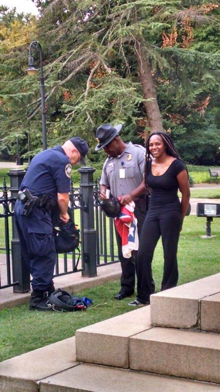[playwirevid id=’3696397′]
By Jacqueline Bediako
There is beauty in the fearlessness of the activism exhibited by 30-year-old Bree Newsome and her protest partner. On the morning of June 27, Newsome scaled the flagpole outside the capitol building in South Carolina to remove the Confederate flag—a painful emblem of white supremacy.
Newsome’s heroic act was rooted in a consciousness that demanded immediate change. Her activism is the kind that jumps over bureaucracy and time wasted debating. It is the kind that runs past those who drag their feet, and simply latches onto real results.
Consequently, a flag came down and a Black heroine was born. People took to Twitter and Facebook calling Newsome a “Black Superhero” or “Warrior Queen.” Her display of activism bounced off screens around the country.
Even when told to stop by police, Newsome continued pulling herself up the flagpole with laudable strength and determination. She seemed self-assured, and her resilience and bravery was intrinsically beautiful.
Artists absorbed Newsome’s act of resistance in all its glory, as well as her inner and outer beauty. Artistic impressions were quickly created showing Newsome scaling the flagpole. She became the prominent Black model in each depiction.
After removing the flag, there is a photograph of Newsome with her flowing mass of natural hair twisted in dreads smiling at the camera. Her smile evokes pride and implies that whatever the police choose to do next is irrelevant.
The flag is down.

And so, when self-love becomes an embedded component of Black identity, there is an outright rejection of oppression and victimization. Self-love directly opposes anything and anyone that inflicts harm on Black bodies and Black minds.
In this context, self-love is both personal and generous because it drives acts of “civil disobedience,” which aim to liberate entire communities.
Newsome articulates this desire to liberate communities in an extract from her statement:
“We call all people to join us and stand as a united front, to take an active role towards liberating ourselves through the dismantlement of the largest form of oppression, white supremacy.”
Self-love was also seen among the women who participated in protests under the hashtag #SayHerName in San Francisco on May 21. Here, protesting topless helped Black women regain ownership over their bodies, revel in their beauty, and highlight the need to recognize the plight of Black women exposed to police violence and victimization.
Newsome’s established repertoire of self-love makes her a threat to a corrupt and racist system. Her self-love lifts her out of the system and turns her into a critical spectator and agitator, who freely demands what is right, just and good.
Clearly, Newsome should be revered and not criminalized; her act was rooted in the current climate, where many are still dealing with the grief precipitated by the horrific massacre in Charleston. This massacre happened at the hands of a white supremacist domestic terrorist who was inspired by the Confederate flag.

“We could not sit by and watch the victims of the Charleston Massacre be laid to rest while the inspiration for their deaths continue to fly above their caskets,” Newsome said in a statement.
Newsome is an educated woman whose creative endeavors have added value to society. She holds a BFA in Film and Television from New York University’s Tisch School of Arts. Newsome is not a criminal, but a model of rectitude.
Of course, the removal of the flag should not distract from the complexity of racism in America. It’s almost too easy to just talk about the flag, and refrain from engaging in profound discussions about racism. Mass incarceration, limited access to adequate housing, high levels of poverty, employment discrimination and inadequate health care affect the Black community at disproportionate rates. The list of injustices lodged in racism is just too long, and to fully address these injustices we need real and enduring change that stretches beyond the removal of racist symbols. Nevertheless, the removal of the Confederate flag is necessary and overdue.
Newsome could not wait for Governor Haley to put her words into action, and so she took matters into her own hands.
The beauty of Newsome’s activism is undeniable.


